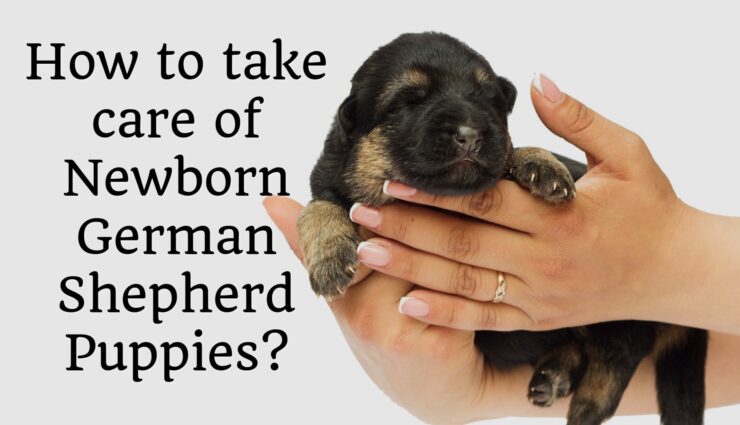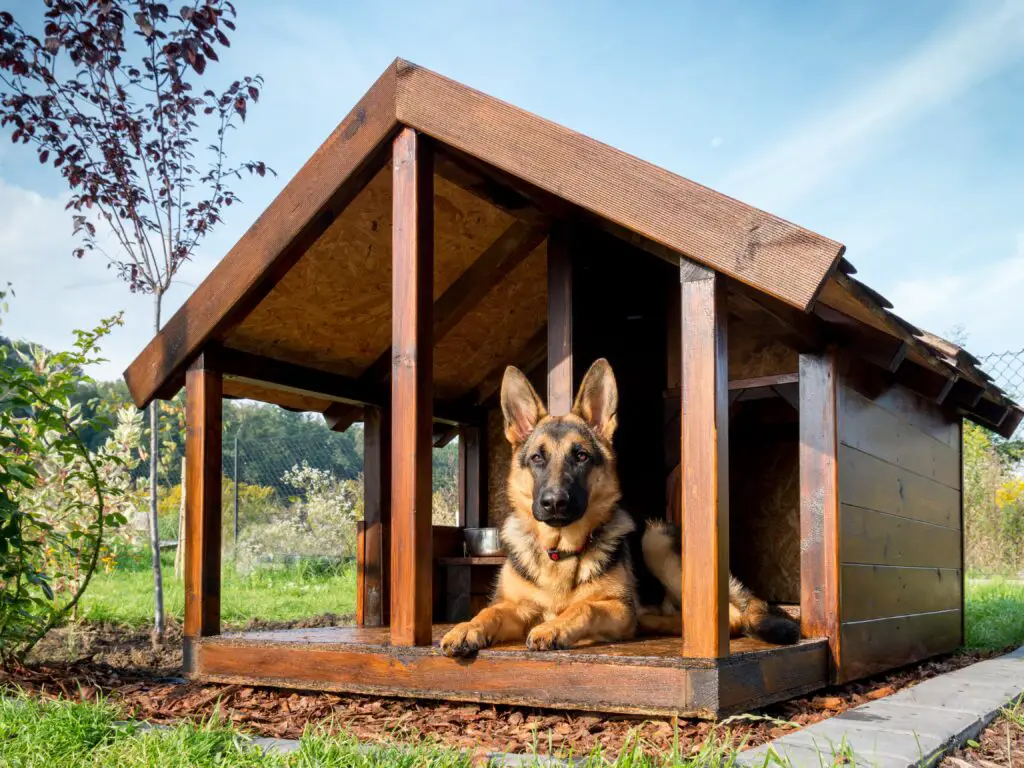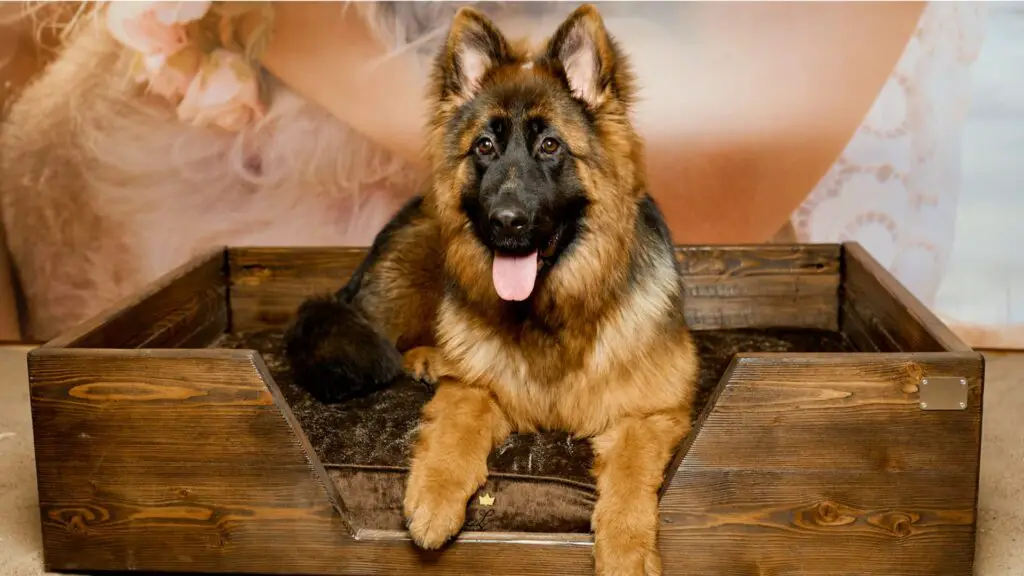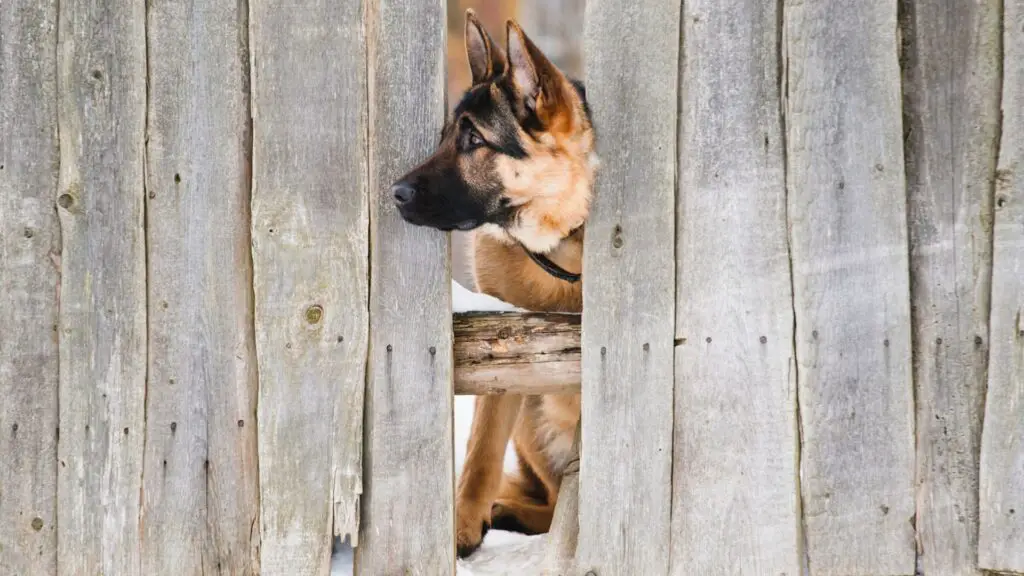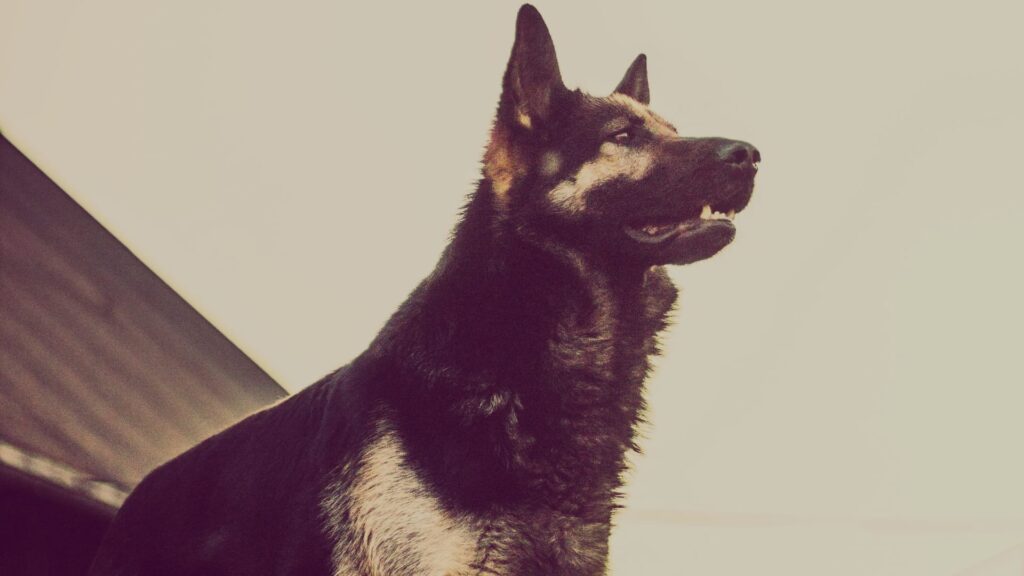Female German Shepherd Dogs carries newborn German Shepherd puppies in the womb for about 64 days.
Thereafter, when they are born, they should be handled with great care, especially in the critical period of their initial days and the coming weeks.
Newborn German Shepherd puppies require 24-hour care and effort, as they can neither see until 8-14 days nor hear till 5-8 days.
They can only sense their mother’s warmth and cannot stand until 2-4 coming weeks. Altogether, they are born with zero social skills and zero baby teeth.
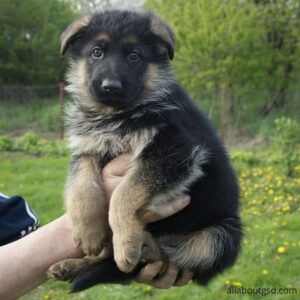
Takeaway facts:
- Mostly, the first newborn German Shepherd Puppy of the mother is a male! Interesting, right?
- German Shepherd Dogs are known for having a large litter size and can deliver up to 2-14 Baby German Shepherds, taking their average litter size to 8.
Here’s an article to guide you on how to take care of a newborn German Shepherd puppy the right way!!
How to provide proper ‘nesting’ for Newborn German Shepherd puppies?
For proper nesting, you should prepare and provide a big, safe, and warm bed box for the mommy German Shepherd and her baby German Shepherds (before their birth) in a quiet room.
This bed box is known as a whelping box.
Here, you should ensure –
- Placing Newspapers- For a quick clean up
- Placing towels and Blankets- Stretch them tight so that the newborn German Shepherd puppies aren’t lost underneath them
Ensure that the size of the whelping box is large enough to accommodate the female Shepherd Dog and her newborn German Shepherd puppies easily.
Note – If you are unable to prepare a whelping box for the newborn puppies, just go for a crate directly.
Why should you build a proper nest?
A mother will always want a safe puppy area to deliver her newborn puppies. Therefore, building and providing such a bed box would save the Shepherd Dog from the pain of looking for a personal place to deliver her newborn baby, and make you a good prospective owner.
What is the ideal heat source for Newborn German Shepherd puppies?
Newborn German Shepherd Puppies can’t keep up a legitimate internal heat level and chilled puppies even suffer death, if not given proper 24-hour care.
So, it’s frequently important to place ideal heat sources such as a warming product or a heating pad at a fair distance (protecting the newborn German Shepherd puppies) to maintain the room temperature.
Ideal Temperature for a Newborn Puppy (German Shepherd Dogs)-
- Initial 2 Weeks- 30-32° Celsius or 85-90° Fahrenheit
- End of 3rd Week- 22°C or 65-80° F
Preferred Humidity for a Newborn Puppy
55 percent to 65 percent- It will help in strengthening the immune system of the newborn German Shepherd puppies and also serve as an aid in improving the puppy’s health.
What are the major steps involved in the birthing process of Newborn German Shepherd puppies?
The steps to be followed in this process are:
- Monitor the body movements of each Baby German Shepherd to ensure that every single puppy is in good health.
- Make sure that each baby German Shepherd is breathing properly.
- If the newborn German Shepherd puppy’s health is not in a good condition, try pouring a drop of liquor on its tongue.
What you should do immediately after the birth of a Newborn German Shepherd puppy?
After they are born, the newborn German Shepherd Puppies should be immediately nursed by the nursing female for proper puppy health.
The nursing activity animates withdrawals in the mother and gives significant colostrum to the newborn German Shepherd puppy.
Generally, the mother separates herself from her newborn German Shepherd baby by cutting the umbilical cord.
However, if she is exhausted, be a responsible prospective owner and clean the belly button and the private parts of the mother German Shepherd Dog.
Use a sanitizer (especially in these times) and place towels on the baby German Shepherd to clean them until they are dry.
Do you know that there is a term called ‘clean ones‘ with respect to newborn German Shepherd puppies?
This term is used for those newborn German Shepherds who are tenderly licked by their mother!
What is the average weight of a Newborn German Shepherd puppy?
The average weight of a Newborn German Shepherd baby:
- The average birth weight of a newborn German Shepherd baby is anywhere from 0.08 pounds to 1.3 pounds
- By the end of the 1st week, the baby German Shepherd’s body weight is approximately 1.6 pounds to 2.1 pounds
Which device is used for the measurement of the weight of Newborn German Shepherd puppies?
Measure every single puppy’s weight using a weighing scale and maintain a habit of logging it down daily.
Giving birth is the foremost primary deed, while maintaining a healthy environment to grow is the most prominent and important thing!
Tip: As the average litter size of a German Shepherd Dog is 8, it is certainly difficult to identify each baby German Shepherd. To simplify the process, tie different colors of thread to the necks of each newborn German Shepherd puppy.
Taking Care of a Newborn German shepherd Puppy
Now that you have new bundles of joy in your home, it will be your sole responsibility to give them premium care and attention.
What you will note is that each growth phase of a newborn German shepherd puppy has different needs.
Below are some of the stages that will guide you on how to take care of a German shepherd puppy :
Newborn Puppy: 0-3 Days Old German shepherd Puppy
During this phase let the mother GSD nurse the puppies by herself.
However, you are not relieved of the duties of taking care of the newborn German shepherd. Your task is to ensure that the mother and her litter are comfortable.
Consequently, if you have no prior experience nurturing newborn German shepherd puppies, you can seek guidance from your vet.
First, ensure the puppies are not having any breathing difficulties. Clear the nasal passages by using a suction bulb syringe if any blockage occurs.
Also, the constant checking of temperatures during this phase is crucial. Ensure the outdoor and indoor temperatures are not harsh for both the puppies and the mother.
As earlier discussed, temperatures during this phase should range from 30 to 32 degrees.
Next, ensure the dam and its litter have a warm, cozy sleeping area. Make it a priority to change the beddings every 12 hours. During this phase, puppies soil their sleeping area a lot as they spend most of the time breastfeeding.
Leave the duties of bathing the puppies to the female German shepherd. Not unless the mother is absent.
In the absence of the mother GSD, bathe the puppies using clean, warm, moist cloth.
Worth noting, during this phase, the puppies are entirely dependent on their mother. Ensure the mother is exclusively breastfeeding its litter.
1 To 2 Weeks Old German shepherd Puppy
Week 1; the puppies are still blind; however, they can still trace their mother’s teats. Additionally, there is minimal growth in weight and height during this phase.
Puppies during this stage rely on their mother’s colostrum. Don’t bargain when it comes to the quality of food you give to the mother GSD. Inferior quality of food will translate to less nutritious colostrum.
Additionally, feeding the mother with the wrong food will make the newborn German shepherd puppies develop gut disturbances. If you note abnormal stool, notify the vet as soon as possible.
Unlike when puppies are young, they will start to defecate on their own. You’re only liable for ensuring they have a defecation-free sleeping area.
Two weeks puppies often have weak legs; you will find them having wobbly movements. Thus keep them in an enclosed area where they won’t stray away from their mom.
Furthermore, learn to take the puppies’ weight daily- as it will enable you to gauge whether the puppies are in the right trajectory of growth.
Also, monitor whether the mother GSD is producing enough colostrum for the puppies. And if so, ensure that each puppy on the litter is getting the right quantity.
3-4 Weeks Old German shepherd Puppy
It’s all systems go as all the puppies’ key senses start to function. The newborn German shepherd puppy’s eyes and ears open up. And eventually, they can use their feet well without wobbling around.
During this period, they are curious and interrogative of their surroundings. It’s during this phase that puppies learn how to socialize. Keep a close eye on them during these two weeks as it will shape up their personality.
Next, the puppies can now fully defecate by themselves. Your only responsibility will be to clean the area and make their beddings comfy.
Also, you will note that their teeth will start developing at this stage. Puppies at this stage love nipping on each other’s ears and biting other objects around.
Sorry, you will have to contend with that.
You can also introduce puppy food during this stage (more to this later)
At this point and phase, your responsibility is to keep the puppy’s behavior in check.
5-6 Week Old German shepherd Puppy
There is a rapid growth of weight and height during the fifth and the sixth week. Consequently, during this phase, you can differentiate males from females according to their physicality. However, it will depend on how you are feeding them.
After hitting six weeks, completely wean them off their mother’s milk. You will also note that the mom will be reluctant to breastfeed them, as their dietary requirements are high by now.
And still, she will be reluctant to breastfeed them as they keep nipping off the teats.
Puppies at this phase will have loads of energy. Thus look for ways you can dispense off that energy. For example, by playing with them or letting them access chew toys.
Chew toys will also help their teeth to grow and become healthy.
7-8 Week Old German shepherd Puppy
During this phase, the puppies cease from being dependent on their moms.
Also, brain development is at its peak; thus, you can seize this opportunity by enrolling them in obedience and training classes.
During this phase, let the puppies feed on quality food that your vet recommends for you.
Next, during this period, puppies will develop a fear of new people and environments. To curb such behavior, let the puppy get adequate socialization skills.
Highlight: exposure is essential for the puppy during this phase. Let the puppy come across new sounds and sights.
Next, this is the phase that puppies get the necessary shots. More on the vaccination schedule later.
Highlight: training, socialization is crucial during this phase. It is the make or break stage of how your dog will grow.
Here is an article entailing how you can take care and train an 8-week old German shepherd puppy.
9-10 Week Old German shepherd Puppy
There is rapid growth during this phase, thus ensure all the puppies get their daily calorific needs fulfilled. However, if you are unsure what to feed the puppy, seek an advisory from your veterinary.
Socialization and training are still important during this phase.
Introducing Your German shepherd Puppy to Solid Food
Puppies won’t rely on their mother’s milk forever. Introduce them to solid food.
Start introducing puppy food when they hit 3- 4weeks. It is a gradual process that will require patience.
When to Start Puppy Food
- You can start puppy food when you notice signs of teething.
- The mother is reluctant to breastfeed them.
- The mother is not producing enough milk for the ‘little dogs’.
Proper nutrition will be crucial during this phase. Thus, don’t use any commercial food labeled puppy food. First, consult your vet on the best food to start for your puppy.
From Milk to Solid Food: How to Introduce Solid Food to a German shepherd Puppy
Relatively easy to say but can be hard to start and maintain if done wrongly. First, don’t pour dry solid kibble in a bowl and force your puppy to eat right away. It will not work that way.
To enhance digestion, ensure the food is wet and smooth.
The Steps…
Take the kibble and put it in a clean feeding bowl. Next, mix it with special dog milk formula often available in pet stores.
Next, add some lukewarm water and mix them until they form a mushy paste.
Note, at first, this paste should be watery. You can entice the puppy to feed on this paste by dipping your finger in the paste. Let the puppy suck your finger till it reaches a point it can eat the food without your help.
Next, make the food more solid by reducing the quantity of liquid in this phase. Let it be gradual. The quantity of liquid used to soften the puppy’s kibble should reduce week by week.
Additionally, be attentive to the feces, as it is common for weaned puppies to develop transition diarrhea.
Transition diarrhea occurs when you introduce solid food at once.
As earlier stated, it should be a gradual process.
You can also reduce the incidences of transition diarrhea by using quality dog food.
Poorly planned food will bring up gut disturbances.
How Many Times Should I Feed My Newborn German shepherd Puppy?
Don’t overfeed or underfeed your dog.
Source for a vet’s advisory on how many times you can feed your newborn German shepherd puppy.
However, one thing to note is that puppies require more food and frequencies of feeding than adult German shepherds.
The reason being, puppies require more calories to keep up with the high growth rate of muscles and cells.
Whereas adults require enough quantity to keep them healthy and at an ideal weight.
Here is a simple guideline on how many times to feed your puppy
- 1-3 months- need to feed on four meals a day.
- 4-6 months frequency reduces. They should eat 2-3 times a day.
- 6 months onwards- quality food given twice a day is adequate.
Vaccination Schedule of Newborn German shepherd Puppies
It would help if you kept your dog free of diseases by vaccinating them.
Most of the shots are one of, whereas other vaccines require regular booster shots.
Here are some disease that your puppy should get vaccinated from –
- Canine distemper
A contagious viral disease that affects the respiratory system.
- Rabies
This a vaccine that most countries require every dog to have. Mostly affect the central nervous system, thus causing paralysis and even death.
- Kennel cough
A contagious disease that you should ensure your dog gets vaccinated from. Often useful if you will enroll your dog in a dog day-care.
- Canine hepatitis
Though not related to human hepatitis. This viral disease affects the liver and kidney.
| Age of the puppy | Recommended vaccine |
| 6-8 weeks | Distemper, parvovirus, Bordetella |
| 10-12 weeks | Distemper,hepatitis,parainfluenza,parvovirus(DHPP) |
| 16-18 weeks | DHPP and rabies, Lyme disease |
| 12-16 weeks | DHPP and rabies, leptospirosis |
Also, remember to deworm your puppy regularly.
How to prepare a commercial milk composition for Newborn German Shepherd Puppies?

Given below is a way for you to prepare a commercial milk composition that is as good as the newborn German Shepherd puppies and can be used as a dog milk replacement:
- 6 grams of powdered bones
- 27 oz of cow’s whole milk
- 1 egg (whole)
- 6 oz of cream
- Vitamin supplements (A, D,..)
This puppy milk replacer is to be served in a warm water bottle, hot water bottle, or baby bottle at room temperature.
After giving birth to Shepherd puppies, the mother Shepherd Dog does not secrete milk. Instead, she secretes a yellow substance known as ‘Colostrum’.
This Colostrum is very beneficial as it helps to transmit the maternal antibodies present in the mother’s body to the newborn puppies.
These maternal antibodies contribute to the innate immunity, improving the overall immunity system of the Shepherd puppies.
However, sometimes maternal intolerance may occur because of various reasons and you may need to find a milk substitute for the newborn German Shepherd puppies like another nursing female GSD, lactating mother, or even look out for artificial feeding.
Fact check:
- The lactating time for Shepherd puppies is 2 months.
- 80 percent to 90 percent of newborn Shepherd puppies die due to the lack of benefits from colostrum.
- It is astonishing that even after being blind, newborn German Shepherd puppies can locate the nipples of their mother!
Final Words
Apart from all the above guidelines, you need to take care of:
- Newborn German Shepherd puppies‘ Hygiene.
- Train them with the basic commands and techniques such as bite inhibition.
- Feed them with a worming product.
- Arrange a flea treatment session for them.
- Make sure that the newborn German Shepherd puppies have a quiet room for their personal space and resting.
- At the age of 4 weeks, feed them with solid food or puppy food. This is done to ensure that they get all the essential nutrients (that are not provided by the baby German Shepherd mother’s milk).
- Keep a check on the newborn puppy’s body temperature and weight gain.
- The weaning process of the newborn German Shepherd puppies should begin between 3-4 weeks of age and continue till 7-8 weeks of age.
- Use a proper feeding syringe in case your baby German Shepherd has a broken jaw, or is suffering from a serious dental problem, or is too young (4 weeks) to consume solid food or puppy food on their own.
And at last: Train, care, and feed these family pets with love and these little creatures will be your companions for the entire life!
Here is a video you may like: Featuring 8 German Shepherd puppies only 12 hours old
You May Also Like to Watch: 3 Newborn German Shepherd Puppies


